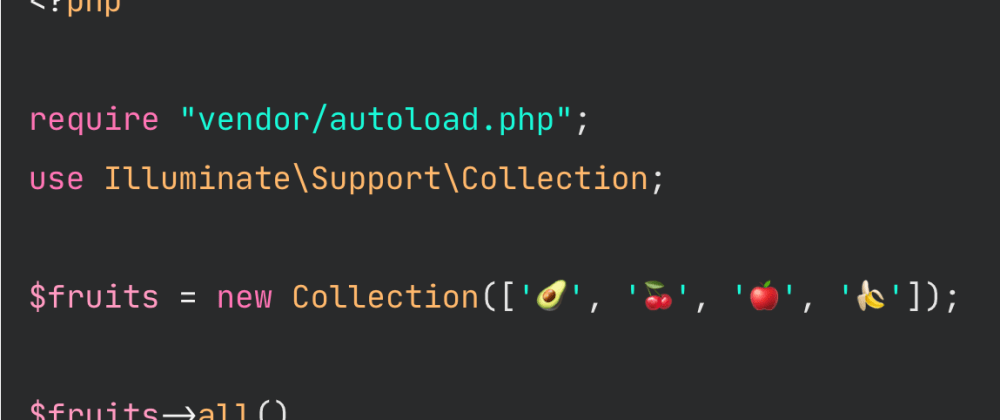

Using Collections package outside of Laravel
source link: https://dev.to/robertobutti/using-collections-package-outside-of-laravel-1alk
Go to the source link to view the article. You can view the picture content, updated content and better typesetting reading experience. If the link is broken, please click the button below to view the snapshot at that time.


Posted on Feb 15
Using Collections package outside of Laravel
If you used Laravel, probably you know and used the powerful Collection class.
The Collection class (Illuminate\Support\Collection) is included in the Illuminate Collections package illuminate/collections
Collection class is useful when you need to work with collections of data, and you need some additional powerful method.
The Illuminate\Support\Collection class provides a fluent, convenient wrapper for working with arrays of data.
PHP has a lot of functions to manage arrays. The PHP official documentation for array functions is: https://www.php.net/manual/en/ref.array.php
So, why would you need Collection class?
Sometimes I used Collection instead of PHP array:
- when I need a superset of additional functions: https://laravel.com/docs/9.x/collections#available-methods;
- I want to chain methods to perform fluent mapping and reducing of the underlying array;
- because collections are immutable, meaning every Collection method returns an entirely new Collection instance;
- because collections are "macroable", which allows you to add additional methods to the Collection class at run time.
If I'm working on a PHP project without Laravel Framework, can I use Collection class? The answer is YES 🥳🥳🥳
Install illuminate/collections package
Let me start with a new PHP project from scratch, using Composer
mkdir test-collections
cd test-collections
composer require illuminate/collections
Enter fullscreen mode
Exit fullscreen mode
The composer command generates the composer.json file. If you open it:
{
"require": {
"illuminate/collections": "^9.0"
}
}
Enter fullscreen mode
Exit fullscreen mode
One important thing to know is that Illuminate Collections 9 requires PHP 8 (version greater than 8.0.2).
The dependencies of Illuminate Collections 9 (9.0.2) are:
illuminate/collections v9.0.2 The Illuminate Collections package.
illuminate/conditionable v9.0.2 The Illuminate Conditionable package.
illuminate/contracts v9.0.2 The Illuminate Contracts package.
illuminate/macroable v9.0.2 The Illuminate Macroable package.
psr/container 2.0.2 Common Container Interface (PHP FIG PSR-11)
psr/simple-cache 3.0.0 Common interfaces for simple caching
Enter fullscreen mode
Exit fullscreen mode
If you can't use PHP 8 for any reason (for example if you are using PHP 7.4), you could consider using the previous version of the package, the version 8.
PHP Version Collections Version
7.4 8
8.0 9
8.1 9
My strong suggestion is to use an updated stack, so PHP 8.x and Illuminate Collections 9.
To install a previous version of Illuminate Collections package:
composer require illuminate/collections:8.x
Enter fullscreen mode
Exit fullscreen mode
Use Collection class
Once you have installed the package, you can start using the class, let's see how.
<?php
require "vendor/autoload.php";
use Illuminate\Support\Collection;
$fruits = new Collection(['🥑', '🍒', '🍎', '🍌']);
print_r($fruits->all());
/*
Array
(
[0] => 🥑
[1] => 🍒
[2] => 🍎
[3] => 🍌
)
*/
Enter fullscreen mode
Exit fullscreen mode
You can:
- require the autoload file;
- import (via use keyword) Illuminate\Support\Collection;
- instance the Object from Collection class;
- use a method like all() from Collection class.
For instancing Collection object, you can use new or calling the static method make:
$fruits = Collection::make(['🥑', '🍒', '🍎', '🍌']);
print_r($fruits->all());
Enter fullscreen mode
Exit fullscreen mode
2 examples, same result. Under the hood, make it call and returns "new Collection()".
You can also create a specific macro, so you can add the new method at runtime to Collection object
<?php
require "vendor/autoload.php";
use Illuminate\Support\Collection;
Collection::macro('blend', function () {
return $this->map(function ($value) {
return mb_chr(mb_ord($value) + 1);
});
});
$fruits = Collection::make(['🥑', '🍒', '🍎', '🍌']);
$newFruits = $fruits->blend();
print_r($newFruits->all());
/*
Array
(
[0] => 🥒
[1] => 🍓
[2] => 🍏
[3] => 🍍
)
*/
Enter fullscreen mode
Exit fullscreen mode
Collection with nested data
You can create collections with structure data (not just flat array):
$collection = Collection::make([
"avocado" =>
[
'name' => 'Avocado',
'fruit' => '🥑',
'wikipedia' => 'https://en.wikipedia.org/wiki/Avocado'
],
"apple" =>
[
'name' => 'Apple',
'fruit' => '🍎',
'wikipedia' => 'https://en.wikipedia.org/wiki/Apple'
],
"banana" =>
[
'name' => 'Banana',
'fruit' => '🍌',
'wikipedia' => 'https://en.wikipedia.org/wiki/Banana'
],
"cherry" =>
[
'name' => 'Cherry',
'fruit' => '🍒',
'wikipedia' => 'https://en.wikipedia.org/wiki/Cherry'
],
]);
$filtered = $collection->whereIn('name', ['Apple', 'Banana']);
$some = $filtered->all();
print_r($some);
/*
Array
(
[apple] => Array
(
[name] => Apple
[fruit] => 🍎
[wikipedia] => https://en.wikipedia.org/wiki/Apple
)
[banana] => Array
(
[name] => Banana
[fruit] => 🍌
[wikipedia] => https://en.wikipedia.org/wiki/Banana
)
)
*/
Enter fullscreen mode
Exit fullscreen mode
Chain methods: filtering and selecting columns
You can chain methods and custom (macro) methods.
The scenario is: you want to filter (whereBetween) and select some columns (select macro)
Collection::macro('select', function (array $fields) {
return $this->map(function ($value, $key) use ($fields) {
$columns = [];
foreach ($fields as $field) {
$columns[$field] = $value[$field];
}
return $columns;
});
});
$select = $collection
->select(['fruit', 'name'])
->whereBetween('name', ['A', 'B']);
print_r($select->all());
/*
(
[avocado] => Array
(
[fruit] => 🥑
[name] => Avocado
)
[apple] => Array
(
[fruit] => 🍎
[name] => Apple
)
)
*/
Enter fullscreen mode
Exit fullscreen mode
References
- Laravel Collection methods: official doc;
- Collections package on Packagist;
Recommend
About Joyk
Aggregate valuable and interesting links.
Joyk means Joy of geeK